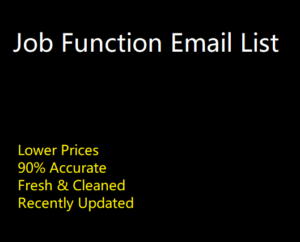Job description, a fundamental aspect of human resource management, serves as a key function in organizational success. It plays a vital role in defining the responsibilities, qualifications, and expectations associated with a specific job position. In this article, we will delve into the significance of job descriptions as a crucial function of management and its impact on organizational efficiency and productivity.
1. Establishing Clarity and Direction:
One of the primary functions of job descriptions is to provide clarity and direction to both employees and managers. By outlining the essential tasks and responsibilities of a job, employees can clearly US Companies Board of Directors Email List understand their roles and the specific outcomes they are expected to achieve. This clarity ensures that employees focus their efforts on tasks that align with the organization’s objectives, thus enhancing overall productivity and efficiency.
2. Supporting Recruitment and Selection:
Effective management involves hiring the right people for the right positions. Job descriptions play a pivotal role in the recruitment and selection process by serving as a foundation for candidate evaluation. These documents provide a clear picture of the qualifications, skills, and experience required for the job, helping recruiters and hiring managers assess applicants’ suitability for the position. Hiring individuals who align with the job description ensures a better fit within the organization and reduces employee turnover.
3. Enabling Performance Management:
Job descriptions are essential in managing employee performance. They establish performance expectations, key performance indicators (KPIs), and goals for B2C Fax each job position. Managers use these descriptions to measure employee performance, provide feedback, and conduct performance evaluations. Aligning performance assessments with job descriptions ensures a fair and objective evaluation process, motivating employees to achieve their best potential.

